AJ Subat helped scores of strangers evacuate Afghanistan. Then he became a hero, a brother — and got in way over his head.
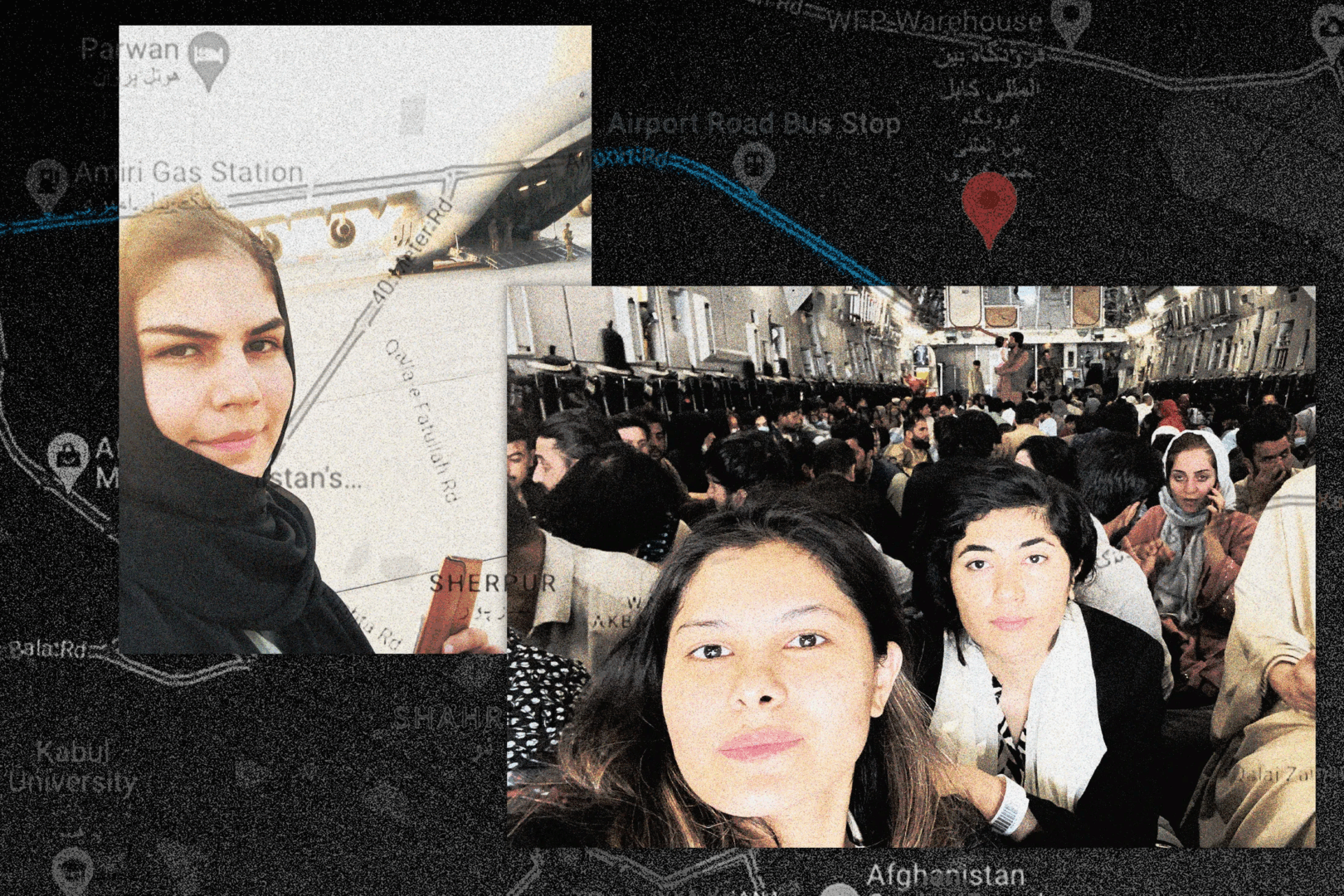
On the night of August 23, 2021, nine women, three men, and a baby stood before Immigration officials at the Dulles Expo Center in Washington, D.C., debating how to proceed. They had departed Kabul three days earlier, each with one small backpack. Negin Khpalwak, Afghanistan’s first female orchestra conductor, brought diapers and snacks for her 1-year-old daughter, Maram, whom she carried in her arms. Helal Massomi, an adviser to the government, smuggled in her laptop even though its discovery by the Taliban soldiers at the airport would have scuttled their escape and possibly ended her life. Zahra Hashimi, who didn’t have a passport, thought it best to bring her high-school and university diplomas.
There had been so much waiting: on flattened cardboard boxes at the Kabul airport for passport control and fingerprints, for showers at the filthy military base in Qatar, then again, inexplicably, on the tarmac in Bonn and again in D.C. Now, at the Expo Center, they had at last reached the front of the line. And the U.S. agent there was telling them, in a bullying tone, that they should wait to be shuttled to a refugee camp at a military base in Texas, then wait an unspecified number of months to receive the documents that would allow them to work and earn in the U.S. This was the most expeditious way, the agent said.
But the American stranger who had shepherded them this far was advising a different course. From a music studio in a converted dentist’s office in Orange County, he had directed them by GPS and text message from safe houses into taxis, then through the pandemonium at the Kabul airport amid horrors: the Taliban firing into the crowd, beaten women lying on the ground, a man with his face torn by bullets, desperate parents handing babies to strangers over the airport fence. On a signal from a contact in the U.S. military, the American had directed these Afghans into the protective custody of a soldier working the northern airport gate who had a manifest of their photos and ID numbers in his pocket. When the group entered the safe zone of the airport, Helal, the team leader, texted their remote guide: “You are like Kabul’s mountains to us.” And, alone in his studio at 4 a.m., AJ Subat — 36 years old, a musician and a onetime history major, stand-up comic, Lyft driver, and software salesman — started keening and stomping in relief.

By text, AJ was recommending that the group leave the Expo Center. The U.S. camps were dirty, disorganized, possibly dangerous. Besides, he and his fiancée, Jahan Shahryar — a Berkeley Law graduate and a former associate at Skadden, Arps — had arranged everything. They had retained the law firm Akin Gump to do the Immigration paperwork pro bono. Jahan had cold-emailed Airbnb, and the company agreed to cover temporary housing. They had friends, local Afghan Americans, ready to drive the group to the Airbnb in Arlington, Virginia, where they could shower and, finally, sleep. Someone got AJ on the phone, and Elham Karimi, who had been a BBC journalist in Kabul, grabbed it. She had found the Qatar camp unbearable. It was her 25th birthday, and until three days ago, she had lived with her parents. “AJ told me, ‘Don’t worry. We will do everything for you,’” she said.
The sudden, total fall of Afghanistan to the Taliban was an international crisis and, for the average American, a complete shock. After seeing footage of the choppers lifting off from embassy rooftops and the terrified mobs at the airport gates, a random assortment of U.S. civilians ran into the breach. Outside New York City, Corinne Snow, a former Justice Department employee on maternity leave from her law-firm job, tried to evacuate female judges from Kabul; from Fredericksburg, Virginia, Andrew Tuohy, a former Navy corpsman, DM’d an Afghan pilot he followed on Twitter and was part of a team that helped him and his family reach Oklahoma. AJ would ultimately help to evacuate more than 100 people from Afghanistan. Nearly all of those newcomers would be channeled to refugee camps at military bases, but for a brief sliver of time, the option existed to exit the camps — a loophole in DHS procedure that would bind AJ with this first group, 12 evacuees whom he had labeled on his spreadsheet “Team A.” “No one person should be in the position of doing this, but that was part of the chaos,” AJ told me. “Shit is fucked up.” In the turmoil, he, a singer-songwriter who spoke elementary Farsi, was the best option they had.
Only Hamid Habib Zada, Negin’s husband, wondered aloud whether they might do better to stay where they were. The Immigration official warned that the minute they departed the Expo Center, they would be on their own, freelancing their resettlement outside official channels. But the women wanted to stay together. They trusted AJ. And so most of the members of Team A — a government adviser; a human-rights activist; two journalists; an economist; a law student; two college students; and the conductor, her husband, and child, none older than 30 — who had gotten stamps on their documents that said HUMANITARIAN PAROLE, left the Expo Center and walked out onto the street.
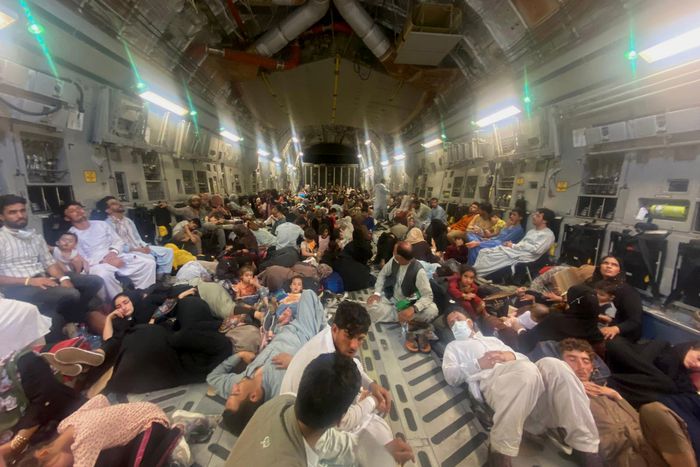
Until last year, Afghanistan existed as a myth in AJ’s mind. Raised in Yorba Linda, California, by parents who had fled in 1979 during the Soviet invasion, he’d had a comfortable American childhood — backyard pools, BMX bikes, and Xboxes — but the priority of his homelife was to preserve the memory of a vanished Kabul. Once a month, extended family, about 100 people, would gather in someone’s living room for a “music night.” There, aunties would serve six different kinds of rice as well as leek dumplings, braised eggplant, and fruits. Musicians on the tabla and harmonium would play traditional Afghan songs, and fortified by good red wine and Johnnie Walker Black, everyone would sing and weep. Thus Afghan identity and culture were passed along to AJ in this vivid and romanticized way, “like a moving production,” he said.
As a child, AJ was eager, undisciplined — the kind of kid who got into trouble and creatively talked himself out of it. In high school, he went to Afghanistan for the first time. In response to the 9/11 terrorist attacks, 130,000 American and allied troops invaded Afghanistan to quash Al Qaeda and its host, the Taliban government, which had been in power since 1996. AJ already hated the association with terrorism that he — a dark-skinned male of Central Asian descent — had to bear in public, and what he saw in Afghanistan disgusted and alienated him even more. The people he met had been hardened by decades of war: the Soviet occupation, then ongoing tribal conflict, then the religious authoritarianism of the Taliban. In the provinces, AJ met a child, about 7 or 8, who said he would take his own life if he could be sure his sisters would reach adulthood without being raped; a cousin told a story of going to a soccer match that was canceled for a beheading. One relative swindled him out of $300.
As he grew older, AJ repeatedly clashed with his father. He wanted to be a musician, and he chafed at the narrow ambitions his father held for him: doctor, lawyer, engineer. And so AJ careered around academically and professionally, entering UCLA on a path to law school then taking up theater, rising at a software company then quitting to do music full time. He was, in his own assessment, a goofball and a fuckup so as not to seem to the world like a threat.
In 2020, when AJ was 34 years old, he was working on a podcast that featured Negin Khpalwak, a Pashtun girl who loved music and practiced in secret until age 9, when she confided her passion to her father, who sent her to take music classes. Though AJ did not meet her during that project, he knew the history well enough: Under the Taliban, instruments were haram (“forbidden”); music stores were bombed, cassette tapes unraveled and hung from signposts. But under the comparative safety of the NATO allies, Negin was able to imagine being an orchestra conductor of classical repertoire and then, miraculously, to become one. In 2017, she and the all-female orchestra she led performed at Davos.
Negin’s existence became for AJ a talisman of what Afghanistan could be. On the internet, AJ discovered a thriving community of young Afghans like Negin who came of age during the American war and were building Kabul in their own image. “I was starting to see this generation of Afghans kind of cut from the same cloth as me,” AJ told me. Women drove cars and walked outdoors unaccompanied and unveiled; young people got tattoos from underground artists; men and women danced together at secret clubs where they smoked cigarettes and drank alcohol. AJ became a member of a global WhatsApp group called Afghan Diaspora Creatives and began to fantasize about his next trip to Kabul.
Still, even in liberated Kabul, the Taliban had not been eliminated, only pushed to the margins, and a broadly constraining Islamic fundamentalism pervaded the country. Every independent-minded woman had a father or uncle who opposed her. Attia Mehraban, a member of Team A, grew up in the provinces and distinguished herself by writing essays arguing against the stigma of menstruation and the sanctity of virginity. Many of her family members disapproved of the salary she earned as a human-rights activist, but when she moved to Kabul, she was able to rent a four-bedroom house and some of them came to stay for months. “Kabul grew up in front of us,” she said. “It was joyful for me to go to coffee shops and smoke cigarettes in front of men.” She loved walking at night: “To prove to the men that it’s also my city. To say, ‘I can do everything you can do here.’”
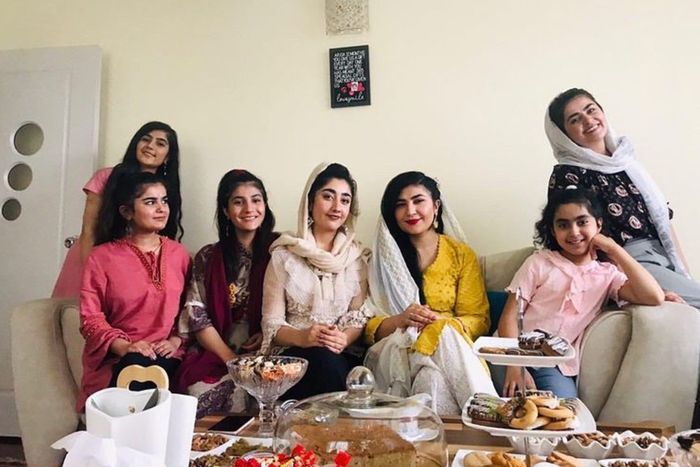
AJ has trouble explaining exactly why he reached out to Negin. When he texted her on August 13, 2021, after getting her number from the podcast producer as the Taliban swept through provincial cities with alarming swiftness, he did not have an actual plan.
Intent on terminating America’s longest and costliest war, the Trump administration had over two years negotiated a U.S. withdrawal with the Taliban on the fiction that this version would be gentler than the previous one. In April 2021, President Joe Biden announced that all American troops would leave Afghanistan before September 11, but no one expected the Afghan government to just give way, President Ashraf Ghani fleeing to the Emirates. In the days before the fall of Kabul, on August 15, AJ felt the terror of the inevitable Taliban victory in his gut: “I just pictured Negin being dragged to the stadium, where they’d chop her head off.” He and Jahan had gotten engaged the previous spring during a vacation in Sedona, Arizona, where, sitting in a river with a view of Cathedral Rock, they confessed their mutual yearning to participate in Afghanistan’s continued evolution as a culturally vibrant and tolerant place. When the Taliban rolled into Kabul, AJ said, he felt like he was “being lifted out by the roots.”
As the Taliban took the provinces and smaller cities earlier that summer, civilians who feared them — single women, teachers, interpreters, and working-class people — fled to Kabul, waiting to rush the airport gates when the evacuations began. Meanwhile, prominent Afghans, whose professional status or outspokenness marked them as infidels, went into hiding with their phones. They reached out to friends, friends of friends, acquaintances — in the U.S. and France, Turkey, Pakistan, England, Germany, and Canada. NATO planes were leaving Afghanistan, but so were aircraft paid for by NGOs, celebrities, and private citizens. In the last two weeks of August, the U.S. airlifted more than 100,000 Afghans out of the country, a tiny fraction of whom were able to obtain special immigrant visas, which gave them a clear pathway to citizenship. Everyone else had to find their own way out: a secret connection, a beneficent sponsor, a brave guide — or be physically strong, extra determined, lucky, or (the likeliest course) a combination of these.
Negin sent AJ her passport information immediately. She was terrified, already hiding her instruments and burning photographs and other documentary evidence of her professional past. But the second person AJ messaged was hesitant. A television personality who anchored a morning news show, Taban Ibraz, 25 at the time, was well known for her YouTube program, Let’s Bowl, in which she, unveiled, interviewed artists, politicians, and intellectuals while bowling. AJ followed Taban on social media, and on August 16, he messaged her. “I want to help you get out,” he wrote. “If you can send your Afghan passport information, I can try my best — it will be tough but there is a chance … Again, my name is Ajmal Subat from Los Angeles.” Anticipating her wariness, he tried to reassure her: “I’m an artist, too.”
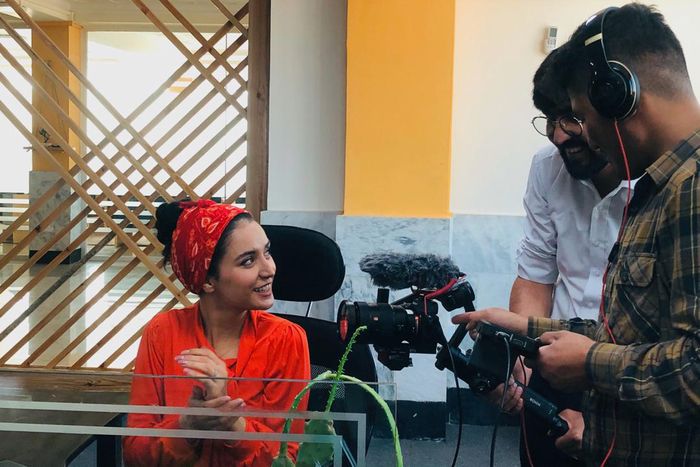
For Taban, leaving Kabul was inconceivable. She had gone freelance at 1TV Afghanistan the previous year to launch an independent media company, and she had recently started looking at spaces downtown. But she knew she could not stay. Her own mother had grown up under the Taliban before 2001: Married to a neighbor at 15, a mother at 16, she had to wear what her father and her husband deemed appropriate. Also, as a female journalist and news presenter, Taban feared for her life. In the spring, she had interviewed the Afghan government’s communications chief, Dawa Khan Menapal, on Let’s Bowl. Wearing a suit and tie, and with a placid face, he compared the Taliban to wild animals and asked, “What do you expect from people who kill teachers, doctors, engineers?” On August 6, Menapal was assassinated by gunmen on the street in Kabul, and the Taliban issued a statement saying he had been “punished for his deeds.” Taban was in danger, her family — mother, five sisters, two brothers — by association with her.
AJ persisted, messaging Taban in English. He had discovered a route out. A man he knew from childhood, now a U.S. Army officer, could engage Neil (not his real name), a soldier working the airport in Kabul. With a detailed manifest, Neil could identify individuals in the hordes by the fences to be escorted through the gate to the tarmac, where American military transports were taking people out in groups of 600 to 800 at a time. AJ badgered his contact to make it happen: He would handle everything else. All he could think was, “If I don’t do this, it’s a crime,” he told me. “I have the studio that I can leverage, fast Wi-Fi, and I’m fucking smart.” The military officer agreed: They would start with ten or so people. This officer wound up running a number of groups with American civilians in charge: a single mother from Orange County, a musician from San Francisco, an accountant from Dallas. AJ set his desktop clock to Kabul time and, on spreadsheets, started listing people he hoped to help.
Taban didn’t completely trust AJ, but she agreed to send her passport information and asked if her family could come, too. AJ said he had room for only one more, a sister: Anaita was 21 years old and a student in international relations. Through a connection in the WhatsApp group, AJ met Attia, and he included Hamid after Negin refused to leave without him. The military contact added two male musicians and Elham Karimi, another journalist. Rounding out Team A were AJ’s three cousins on his mother’s side: Zahra, Hajera, and Moqadasa.
Through WhatsApp, AJ was also connected to Helal, who was 26 and educated in Turkey and Britain. Before the fall of Kabul, Helal worked at a government agency advocating for the inclusion of women, minorities, and war victims in peace negotiations. She lived with a housemate in a high-rise apartment; in the mornings, she would go to the gym and in the afternoons meet colleagues and friends — frequently Attia — at a café for lunch. She walked through the streets unveiled, and when a stranger or shop clerk dared to touch her buttocks or the underside of her arm, Helal would holler until she attracted a crowd. On the day Kabul fell, Helal went to the airport, alone, with a ticket to Turkey, but it was chaos: The plane had no pilot, and on her return home, she learned that the Taliban had come to her apartment seeking her. After she and AJ were put in touch, she showed his photo to her cousin’s husband. “I think this is going to work,” Helal said. In the photo, AJ is smiling and wearing one of his black snapback caps.
“Oh, he’s a boy. I don’t think he can do this,” her cousin’s husband said.
Helal responded, “Do we have another choice?”
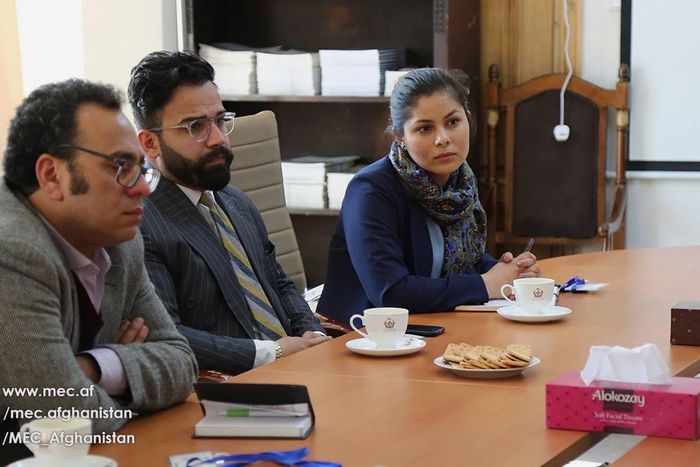
Early in the morning, two days after the women settled into the Airbnb, AJ and Jahan pulled up in an Uber. They had flown from L.A., AJ tamping down his excitement, reminding himself to show respect and restraint. Though he felt he knew Team A intimately, he had to admit he did not know them at all. Here he was, a tattooed and pierced religiously agnostic Muslim-born American man, a Californian who played gym basketball and drank alcohol, presenting himself to a group of mostly single women, some of whom had never been alone with a man outside their family before. On the stoop of the house, he saw Helal and Taban. “Can I hug you?” AJ asked. Anaita told me AJ was the first man she ever hugged who was not a blood relative.
In those early weeks, AJ tried, like a cheerful troupe leader, to keep Team A distracted. Everyone was spread out over the Airbnb, sleeping in the two small bedrooms, the dining room, and the hall, sharing child care and bickering about chores. AJ set up COVID-vaccination appointments and meetings with a lawyer. He got them free cell phones, Zappos gift cards, English lessons, online therapy, laptops, and Patagonia jackets. He took them to Target. Jahan flew back to L.A. after several days, but AJ stayed on for weeks. The group thread from those days is filled mostly with meal planning: How was the pizza from the other day? French or Italian? Who’s cooking rice? Taban knew AJ was a musician — he kept calling himself an artist — but the first time she heard him play the harmonium and sing Afghan songs, she was astonished by how much it moved her. Attia and AJ told loud, filthy jokes, and the baby was always in AJ’s lap.
The more time AJ spent with the members of Team A, the closer he felt to them. “I grew up with a bunch of cousins, Afghan Americans,” he said. “But when I sat down to dinner with these Afghans, I’d never felt like that. They’re my people.” AJ doesn’t believe in what he calls “saviorism shit,” but having brought the women here, he felt an obligation to throw himself in front of whatever problems they had. Team A had lost not just family and language, status and agency, but the material of their lives: family homes built flush against rock cliffs, balconies with cityscape views, dining tables around which their friends gathered. And then there was the news. On August 26, a suicide bomber blew himself up outside the Kabul airport, killing more than 180 and pausing flights at a moment when each passing day meant lost chances for thousands. The Taliban dragged a famous folk singer out of his house in a village north of Kabul and shot him in the head. One night, while Helal was sleeping, her phone rang. She picked it up and heard the voice of a Taliban soldier. “Wherever you are, we’re going to find you. We’re going to kill you. We’re going to rape you,” he said. They had already ransacked her apartment.
AJ called the women “sisters.” He told them they would always be able to depend on him for anything. “For our group, which went through all this trauma, promises like that mean a lot,” Helal said.
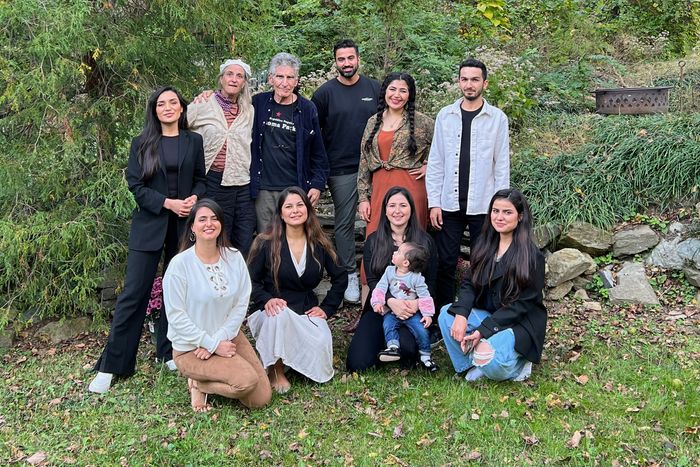
Team A was a test case, and as soon as it successfully lifted off from Kabul, AJ’s phone blew up. Every day, he was receiving between 50 and 100 new messages, each from another frantic person attaching to the texts their justifications: accolades, university degrees, professional affiliations, extenuating circumstances, photos of children. Parents would make pleas on behalf of their children: If you can take one sister, take this one because she is smart. If you can take two, take this one as well because she is brave. AJ and his military contact were identifying at-risk women with a priority for activists, journalists, and artists. They would vet the incoming messages as well as they could, then rank the names, AJ shuffling and reshuffling his spreadsheets, Teams B through G. English speakers got priority because they could be team leaders, as did people who could pay for taxis and arrange safe houses and people with physical stamina and good organizational skills. People without passports had to be denied.
Each of these missions had been heart-stopping. In his normal life, AJ could be scattered, but at the controls, in his music studio in Orange County or on his laptop in Virginia, he was hyper-focused. When in California, he took to sleeping on the couch in his studio. Once he risked driving home after a 20-hour shift to put his head on his pillow, but his military contact called with a “go time” message, so he washed his face, grabbed two McDonald’s sandwiches and two nitro cold brews, and did it again. By September 1, when the American troops pulled out, AJ, in partnership with his military acquaintance, had evacuated about 60 people.
As the members of Team A settled into suburban life, AJ became their surrogate relative, flying back and forth between California and Virginia. (Anaita stored AJ in her phone as “My Big Fat Bro.”) With another Afghan American couple, their friends Dean and Ayesha Sherzai, AJ and Jahan established an organization they called Restore Her Voice, the official entity through which they would raise funds that would help support these evacuees — and, they hoped, many others — in the medium term. The Sherzais, Alzheimer researchers who have written popular books about brain health, have a wide social-media network, and Jahan, who was also well connected, could be on top of the administrative and legal workload. Through one new connection, AJ was able to help make introductions to senators. Through another, he emailed Lutheran Social Services of the National Capital Area, which was running most of the Afghan resettlement in D.C. One day, representatives from Lutheran told AJ they had a VIP who wanted to meet some Afghan refugee women. This turned out to be Angelina Jolie.
Taban, a journalist, understood the base nature of these exchanges: “I’m telling these small private things from my personal life to show that we had a life there.” In the meeting, Taban asked Jolie to do more to help feed the women and children of Afghanistan; the Taliban, disinterested in social services, had abandoned any systematic dispersal of international relief. If Jolie did anything, it was not evident, Taban told me, though several months later she received a signed picture of herself with Jolie. (A spokesperson for Jolie says that she has worked extensively on behalf of the women in Afghanistan.)
The women sometimes bristled at how they were being showcased by AJ in order to raise cash and how the journalists and politicians they met in Washington needed to see them as supplicants “in need of things,” as Helal put it. They had put their lives, reputations, and families on the line to build a new country, and “the U.S. betrayed us by sitting with the Taliban and negotiating with them. Everyone in Afghanistan knows that the Taliban is just a terrorist group,” Helal said.
AJ’s three cousins had departed to Sacramento to live with their brother, a trucker who had emigrated eight years before, and AJ had found a host family for Elham, who desired more solitude. But still, the Airbnb in Arlington began to feel crowded. He enlisted the help of Lutheran Social Services to find something bigger, and in October, the women moved to an extended-stay hotel in Fairfax. Encircled by access roads, near a gas station, an Aldi supermarket, and a CVS, they had nowhere to walk to. Back in Kabul, Helal often went to bed late — she was busy, coming home from work events or dinners with friends. In her own hotel room — a bleak, worn space with an ill-equipped kitchenette and yellow-brown walls — she was awake at night, too, beset by panic attacks often till five or six in the morning. She slept during the day.
Down the hall, Attia, the activist, lived on Twitter. In September, she had learned about a women’s protest in Mazar-i-Sharif. The Taliban captured about 40 protesters and took them away. According to her sources, half of these women were tortured, their bones shattered so they could not stand; the other half were taken into captivity, where they were continually raped. In her room at the extended-stay hotel, Attia listened to recorded accounts of these atrocities, and when Helal and another Afghan friend, walking past outside, looked through her first-floor window, they saw her sitting there crying. “Did something happen to your family?” they asked. She held up the phone and made them listen.
The U.S. was completely unprepared for the arrival of nearly 90,000 Afghan refugees. They were channeled into a government bureaucracy that had been gutted by Trump. “The U.S. refugee program had been underfunded, downsized, almost dismantled,” said Mamadou Sy, the COO of Lutheran Social Services of the National Capital Area. In August 2021, Congress had not yet appropriated any funds for Afghan resettlement. At U.S. Citizenship and Immigration Services, there were only ten agents to process tens of thousands of humanitarian parolees.
At Akin Gump, the pro bono immigration group was “as crazy as I’ve ever seen it,” said Steven Schulman, who runs the practice. There was no centralized process. Afghans were arriving all over the country through official and unofficial routes; every volunteer lawyer connected with a new client had their inbox flooded with pleas from that client’s family, friends, neighbors. Meanwhile, every refugee in the U.S. had family stuck in Afghanistan or in third countries — Qatar, Pakistan, Iran — and desperate to leave. About 50,000 people applied for humanitarian parole, including most of the family members of Team A. But after collecting millions in fees since July 1, 2021, USCIS has conditionally approved only 500 applications.
After September 1, NATO-government evacuations ceased, and the only evacuation flights leaving Afghanistan were private charters. AJ and his military partner had to compete with other volunteer humanitarians for scarce spots, and the negotiations became a hell of begging and back-channeling. In October, the military officer ran one last evacuation operation that — after failing 15 times — got 50 people out, but, though AJ stayed on the text thread, his role was minor. He was depleted. In all, the military contact helped to evacuate 1,500 Afghans.
Time was not passing. This was how it felt to Taban. In the hotel, she was spending weeks in her room, answering the door to no one, not even to Anaita. Since her exit, she had been moving her family around Kabul from safe house to safe house, but from Virginia, she could never be sure of their whereabouts. One day, she learned that a mortar shell had exploded in the neighborhood where her family was staying, and until she heard from her mother, she did not know whether they were alive or dead. As the eldest child, Taban felt a heavy responsibility to care for her family and be reassuring to them, when in truth, “I couldn’t do anything,” she said. “I was nothing. I was a person with no understanding of her future, just sitting in a hotel telling her family that everything is going to be okay.”
The women of Team A were constantly in touch with friends and relatives resettling in the U.S. and, by the end of September, started to receive word that some were leaving the camps with their work authorizations and Social Security numbers in hand; on social media, they boasted of good new jobs. This needled the women of Team A, who had been led to believe that their path outside the camps would be smoother than inside them. AJ reminded them that life in the camps could be harrowing, too, and repeated the stories he’d heard on the news, of sexual assault, a measles outbreak, and food shortages. But their own paperwork seemed not to be moving, and AJ’s reassurances that night at the Expo Center felt hollow. Standing in line, Helal had asked AJ by text about the consequences of forgoing benefits, and AJ had responded, “You don’t need those benefits. When they say ‘benefits,’ they mean one small bed and bad food.” He said, “You have support here.”
“You sure? For everyone?” Helal texted.
“Yes.”
The women of Team A felt helpless. Elham had leads on jobs but no working papers. To apply to graduate programs in the U.S., Helal needed to show her asylum application had been filed. Attia spoke little English, so her dependence on AJ was total. To set the paperwork in motion, the Akin Gump lawyers, volunteers drawn from all over the world, needed to schedule calls, hire interpreters, and validate documents. To translate, and to insulate the women from bureaucratic details, AJ initially ran interference, receiving and delivering all messages between Team A and the lawyers. But some of the women began to feel he was not moving quickly enough, not exerting enough pressure, not communicating clearly, dropping balls. They were texting him daily, asking for updates and explanations. On September 27, Elham wrote in the group chat, “By the way, is it possible to have an update about our work permits, Social Security, asylum, and our financial things? I’m sure you are very busy with all of these.” AJ requested that queries about individual cases be sent to him privately.
All these things took time, AJ tried to explain. “I know you all are growing impatient but I’ve said it since the first day: America moves slowly,” he wrote on the group thread. He and Jahan had jumped in blind (their first step had been to Google “What do you do when you first get into the country?”), and they were taking cues and following the timelines of the overworked lawyers they’d hired. And the rumors about the six-figure jobs — they couldn’t possibly be true. “I’m like, ‘Okay, what does your friend do? He’s an assistant to a professor? He’s not making a hundred thousand dollars,’” AJ said.
He hated being a disappointment to the women, and he began to see anyone outside the bounds of this perpetual emergency as an irritant. His sisters tried to mention the changes they saw in him — his obsessiveness, his anger — and he lashed out at them. At one point, his father tried to tell him that he might do better to leave the administration of the resettlement to the government agencies. “He was like, ‘You’re wasting your time,’” AJ told me. When AJ was a child, his father had been a family hero because he’d helped so many Afghan immigrant families get visas and find good, affordable homes in Orange County, and AJ registered his father’s advice as a betrayal:
“I told him I was embarrassed to be from the same DNA as him.” He regretted it as soon as he said it.
But the deepest source of AJ’s shame was the phone in his pocket. He had saved messages from women he was unable to help, and once the urgency and adrenaline evaporated, during moments when he was alone, he would reread them. “Dear brother!” one woman wrote. “I have 5 children and a husband. I can’t drop them in the war. Please help all of us.” She was an educator, and AJ was working on Team D at the time: On his spreadsheet, he had one empty spot. He asked her, Would she leave Afghanistan alone? She declined.
Basira was an older, uneducated woman whom he put in Team C. She panicked and took herself off the list. And when that group successfully evacuated, she began to call AJ again and again, sometimes wailing, with her children in the background crying, too. AJ was telling her that he wanted to help her, but “she was calling 30 times a day. Calling from different phones. She was saying, ‘Why aren’t you picking up my phone calls? Why did you abandon me? Just give me an update.’” AJ’s rosters were full. Finally he blocked her.
The messages that caused him the most anguish, though, were from a group of five women and one 10-year-old boy from the North — not high-profile professionals as in Team A but members of the Hazara, an ethnic minority. In 1998, the Taliban had murdered 2,000 Hazara over several days, and when the U.S. moved into Afghanistan in 2001, the U.N. discovered mass graves of Hazara in Bamian. (In September 2022, a suicide bomber killed dozens of people, mostly Hazara women, sitting for exams in Kabul.) AJ had placed these women in Team G, the final group on his spreadsheets. They had driven nine hours to a safe house in Kabul organized by AJ. In late September, a woman named Tahmina texted him. “Is there any development about the mission?” she wrote. AJ said he would text when he had more information. “Thanks I am worried and desperate plz do something early sir,” she said. AJ promised he was trying his hardest: “We will save you. In time.” But the last group departed without them, and there were no more flights out. “I hope you can forgive me,” he wrote in one message. Later, when he reread his texts, he thought to himself, “I’m so stupid.”
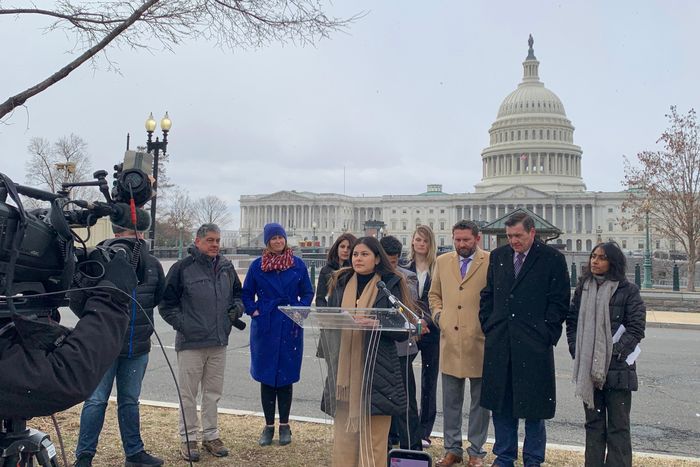
By mid-October, Team A’s paperwork still had not come through. Helal was furious. So was Elham. They understood that out of good intentions, AJ was hoping to spare them hassle and inconvenience. But Elham found that AJ was “not very direct.” And Helal thought he was placating them with half-truths, reassuring them that all their paperwork was moving forward when it obviously wasn’t. For his part, AJ felt he needed to explain to them how things worked in America, the official processes, the administrative necessities. He wasn’t perfect, he conceded, but he was working in their best interest, and the most skilled, reputable, and generous people were assisting for free. But Helal wasn’t buying it. “He was saying it to keep us calm, just saying, ‘I’ve got this,’” she said. “When he was emailing those lawyers, he could have cc’d all of us. Because it was our cases. And we are adults, not children.” From her point of view, she did not flee the Taliban and a brutally misogynistic culture to be constrained by an American man convinced of his own necessity. One afternoon, AJ gathered the D.C.-based group at a benefactor’s house. A photographer was there, and according to Helal, AJ said something about them needing photos sometime in the future. But then, when she looked at the Restore Her Voice website, her photo was displayed with her biography. “It made us feel like he was taking control of our lives,” she told me.
Team A understood that Restore Her Voice was a shoestring operation, founded by people with no experience in nonprofit finance or refugee resettlement, but its mission was to raise money for their housing. Many members of Team A — in particular Negin and Hamid but also Helal and Attia — disliked that AJ could never be clear about how much they were raising, who the beneficiaries would be, how the money would be dispersed. (The relationship between AJ and Negin and Hamid was fractured over disputes about money, and they declined to participate in this story.)
By October 2021, AJ had raised about $200,000, enough to cover rent for each woman for a year. He had launched their housing search from L.A. and, after checking out more than 60 places with the help of two volunteers, found seven affordable apartments in a complex near a Metro in Silver Spring, Maryland, with a landlord willing to rent to refugees with no money in the bank and no credit. His calendar had become that of a busy executive or politician: fundraising in between meetings with congressional staffers, corporate bigwigs, and U.N. representatives. He was texting with Team A about their English classes and trying to follow the legal paperwork for seven different people. All the women had questions about getting visas for their families and sending money abroad, since the Afghan economy was collapsing, banks frozen and then unfrozen.
On October 20, everyone drove to check out the apartments in Maryland. And that evening, at the extended-stay hotel, the members of Team A met without AJ in Helal’s room. All day, AJ had been lobbying hard for these places, pulling women aside, saying things like, “When I was in my 20s, I lived in my car. I never lived in a place this nice.” But Helal didn’t like them. Neither did Attia, and the others had reservations as well. The apartments were dark, some said. The neighborhood felt unsafe. And there was the problem of the Maryland location, reputed to be less accommodating to refugees than Virginia and far from the community of resettled friends emerging there. The following night, the women called AJ to Attia’s room. They sat in a circle and started with compliments: They loved him very much, they said. And they were grateful for everything he’d done. But, Helal began, the name of the organization was Restore Her Voice. So why didn’t he let them find their own apartments with the money he had raised for them?
As the evening wore on, they began to air their grievances. They complained about the money and the paperwork. Some — Attia was one — said they regretted their decision to leave the refugee camp on the night of their arrival and blamed AJ for having pushed them into that choice. AJ became angry and defensive. He tried to explain how much stress he was under. He had spent all his savings flying back and forth and had gained 30 pounds and was losing his hair. “I tried to empathize with their reality of losing their family and their country,” but he did not understand how he could feel so overextended while they argued he wasn’t doing enough. He found himself saying, “I don’t work for you. I’m not your employee. I don’t get paid by this organization. I’m just one person.” AJ tried pointing out all the good things they did get and then he hated himself for it: “Now I’m becoming that parent who’s like, ‘Look what you have! You have food on the table! We’re eating organic! Other people don’t have food!’ And I’m not trying to be that guy.” When they invited him to dinner, he made an excuse. The next day, October 22, he walked the work authorization and Social Security paperwork to the Akin Gump offices, took a photo of himself with the packet, and pushed it out to the group thread.
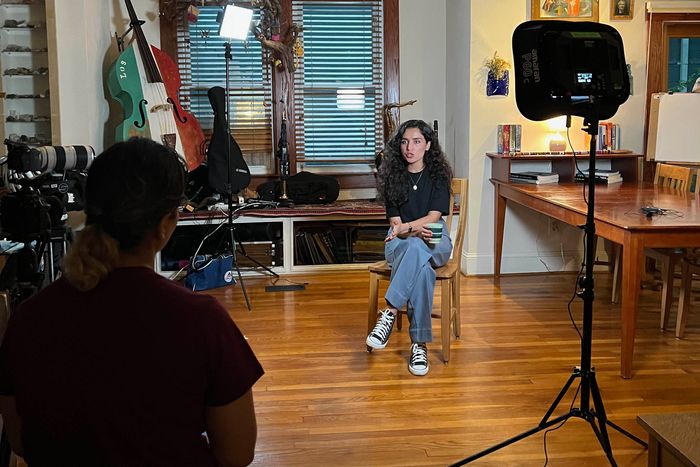
AJ spent the winter trying to sort out what he’d done wrong. He holed up for days in his music studio accomplishing nothing at all, some evenings sneaking in the back door of Jahan’s mother’s house, where he and Jahan lived, so as not to spread his poison mood around. Jahan gently urged him to get some help, and he tried online therapy but hung up on the therapist. The therapist didn’t know where Afghanistan was or what had happened there.
Around that time, he had a conversation with a friend who suggested something he hadn’t dared consider. Perhaps he shouldn’t have tried to save all these people at all. His friend reminded him of his own immigrant childhood: the long years of failing, lying, and conflict with his parents; the shame and defensiveness from 9/11 that no one ever spoke about. “You’re still broken,” she said. “You’re not in a position to help. You’re only giving because you want to feel enough.” Recounting this, as we were driving together in his car, he began to cry: “I didn’t have any respect for myself or peace.”
Around that time, on the phone with an Afghan American friend, he was talking about how painful the ruptures with the women felt and how unfair the blame, and she noted the obvious: that no matter how good-hearted and enlightened a man he was, AJ was always going to be a man. “You can create the emotional space and blah blah blah,” she told him. But what they — escapees from male tyranny — will always see when pushed is a man with a finger wagging at them. AJ got that. Also, they were dealing with losses they could not even begin to assimilate. He understood that, too. “I was the butt end of them realizing, What the fuck. This is forever.”
In the spring of 2022, AJ started planning his wedding. The women continued to text him sometimes, sending him updates about their parents and siblings, their asylum status. He still felt that old sense of focus and importance when one of them asked for a favor or help: to look over a document, to assist with registration for classes, to translate. He remained especially close with Taban and Anaita, texting them about a dream he had or a meal he had cooked. One night in February, he and Jahan were in bed at around midnight when he received a text message from Taban. She told AJ that at that moment the Taliban were in her family’s apartment.
“I’m sorry, I’m sorry,” Taban wrote in Farsi. “I didn’t want to call you.”
“No, please,” AJ responded in English. “I’m grateful that you reached out to me.”
Taban forwarded a video that her younger sister had recorded while hiding in the closet: the legs of men in white wearing fatigue jackets and black gloves, carrying assault weapons, walking among their belongings. She also sent photos of the aftermath: suitcases and drawers ripped open, laptops and books in piles on the floor.
“Barbarians,” AJ wrote. “I’m sorry. This is so upsetting. My heart is breaking for them.”
“I’m sorry,” Taban wrote again.
“Don’t ever say sorry. I’m grateful you feel close to me to share. I’m here for you.”
The women of Team A don’t live near one another now. By the start of this year, their papers started coming through, and most of them are on the brink of something new: Elham is a news reporter at an Arab-world TV network, Taban is interviewing for fellowships in media, Anaita was cast in an independent film and hopes to study acting at UCLA, and Negin and Hamid are scheduled to perform in November with the Alexandria Symphony Orchestra. Attia works at a woman-owned organic store in Mount Pleasant called Each Peach.
Helal is advocating on behalf of the Afghan Adjustment Act, which would give Afghans in the U.S. a clear path to citizenship and, crucially, expand access to special immigrant visas. She and other Afghan activists point bitterly to the disparities in the American treatment of themselves and the Ukrainians fleeing the Russian invasion. By June, more than 17,000 Ukrainians had arrived in the U.S. under humanitarian parole, and more than 24,000 have had their applications approved from their home country, compared to the negligible number approved for Afghans abroad. The U.S. waives application fees for Ukrainians as a matter of course, whereas Afghans have to pay or file a waiver themselves. Telling her story again and again to politicians and lobbyists “exhausts me,” Helal said. “But I need to do it.”

All say they love AJ like a brother and are grateful to him. They believe he had the best of intentions. Having experienced what they’d gone through, they are family, no matter what. Some say this with politeness, others with warmth. Remembering the altercation at the extended stay over housing makes Anaita cry with regret. Taban flashed with anger at the outsize expectations that distorted everyone’s thinking: “We were not his responsibility. He’s not the government. He is not your father.” But “he wanted to do everything by himself, and he wasn’t ready,” Helal added. “He was afraid of asking for help.” AJ agreed with this last point.
Recently, Attia had a party and invited everyone, including AJ. At a certain point, Attia pulled him aside. Their relationship had been close at first and then became bitter. But in recent months, through a connection of his, she had been trying to evacuate some of the protesters from Mazar-i-Sharif. She helped about 25 women leave the country. Having been involved in this evacuation, her number leaked and began circulating among the desperate women of Afghanistan begging to escape. And when she said she could not do anything — she was just one person, working at Each Peach — they lashed out. “You call yourself a women’s-rights activist, but you are just thinking about yourself,” one message said. At the party, she told AJ she now understood how it felt to take on the pain of so many people in crisis. Still, when a friend suggested she try to let it go, she didn’t consider it. Attia responded, “When I stop giving a shit, I stop being human.”